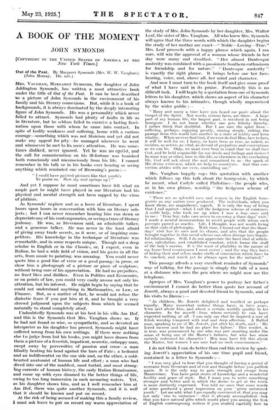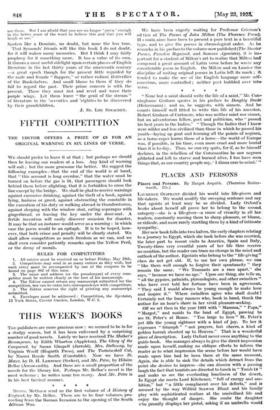A BOOK OF THE MOMENT
.JOHN SYMONDS
[COPYRIGHT IN THE UNITED STATES OF AMERICA BY THE
New York Times.] Out of the Past. By Margaret Symonds (Mrs. W. W. Vaughan). (John Murray. 16s. net.) MRS. VAUGHAN, MARGARET SYMONDS, the daughter of John Addington Symonds, has written a most attractive book under the title of Out of the Past. It can be best described as a picture of John Symonds in the environment of his family and his literary connexions. But, while it is a book of backgrounds, it is always dominated by the deeply interesting figure of John Symonds. His was a personality which never failed to attract. Symonds had plenty of faults in life as in literature, but he seldom failed to exercise a lasting fasci- nation upon those with whom he came into contact. In spite of bodily weakness and suffering, borne with a curious courage—something which was not Stoicism and yet did not make any appeal for pity—he managed wherever he went and whomever he met to fix men's attention. He was some- times disliked, never ignored. Yet lie was no egotist, and the call for commiseration on his ill-fortune was banished both consciously and unconsciously from his life. I cannot remember in his talk or in his books ever hearing or seeing anything which reminded one of Browning's poem :- " I could have painted pictures like that youth's Ye praise so. How my soul springs up ! "
And yet I suppose he must sometimes have felt what an ample part he might have played in our literature had his physical and mental strength not been sapped by the virus of phthisis.
As Symonds' nephew and as a lover of literature, I spent hours upon hours in conversation with him on literary sub- jects ; but I can never remember hearing him run down or depreciate any of his contemporaries, or seeing a trace of literary jealousy. He was, as Stevenson said, an admirable talker, and a generous talker. He was never in the least afraid of giving away trade secrets, as it were, or of inspiring com- petitors. His knowledge in the technique of literature was remarkable, and in some respects unique. Though not a deep scholar in English or in the Classics, or, I expect, even in Italian, he had a wide field of vision, and his gusto in all the arts, from music to painting, was amazing. You could never quote him a good line of verse or a good passaga in prose, or show him a photograph of a picture or piece of sculpture, without being sure of his appreciation. He had no prejudices, no fixed likes and dislikes. Even in Politics and Economics, or on points of law, you could very easily arouse not only his attention, but his interest. He might begin by saying that he could not understand anything in Mathematics, or Law, or Finance. But, as a matter of fact, he would not refuse the dialectic fence if you put him at it, and he brought a very shrewd judgment upon the subjects from which he seemed naturally to stand completely aloof.
Undoubtedly Symonds was at his best in his villa Am Hof, and this is the Symonds that Mrs. Vaughan shows us. If he had not found so wise, so sympathetic, and so devoted an interpreter as his daughter has proved, Symonds might have suffered wrong from his own writings. If there were nothing else to judge from but his books, you might have drawn from them a picture of a feverish, impatient, neurotic, unhappy man, swept away by perversities of passion and error—a man blindly beating his head against the bars of Fate ; a hedonist and an indifferentist on the one side and, on the other, a cold- hearted anatomist of human life and effort ; a man who had dived into one of the maddest, most turbid, and most strang- ling currents of human history, the early Italian Renaissance, and come up with eyes dimmed to the better things of life, owing to too long immersion in such. menacing waters. Yet, as his daughter shows him, and as I well remember him at Am Hof, there was quite another Symonds, and it is well that it should be known and put on record: At the risk of being accused of making this a family review, I must ask leave to put on record my warm appreciation of
the study of Mrs. John Symonds by her daughter, Mrs. Walter Leaf, the sister of Mrs. Vaughan. All who knew Mrs. Symonds will agree that the three words with which the daughter begins the study of her mother are exact—" Noble—Loving—True." Mrs. Leaf proceeds with a happy phrase which again, I am sure, will win the approval of a woman whose friends in her day were many and steadfast. " Her almost Dantesque austerity was combined with a passionate Southern enthusiasm for friendship and for nature." " Dantesque austerity " is exactly the right phrase. It brings before one her face, bearing, voice, and, above all, her mind and character.
And now I must turn to the book itself and give some proof of what I have said in its praise. Fortunately this is no difficult task. I will begin by a quotation from one of Symonds letters to his daughter, which shows an aspect of his character always known to his intimates, though wholly unperceived by the wider public :—
" Many and many a time have you heard me prate about the Gospel of the Spirit. Not words, serious facts, are there. A large part of my human life, the largest part, is involved in not being bourgeois. I do not know whether one gets felicity thereby. I rather think that doubtful. But I am sure the spirit lives— suffering, perhaps, enjoying greatly, sinning deeply, risking the passage from this world into another in a state of nudity and keen vitality. When we ever find God, if we ever do find Him, face to face, it will be well for us, I fancy, to have been as true, as naked, as incisive, as active, as vital, as devoid of prejudices and conventions as we can be. Only, we must ever bear in mind that we shall face God, and be held responsible for our deeds and feelings and desires ! In some way or other, here in this life, or elsewhere in the everlasting life, God will ask about the soul committed to us—the spark of His divine existence, which we help to constitute. And that con- viction abides with me ever, controlling me."
Mrs. Vaughan happily caps this quotation with another which follows up this talk about the bourgeoisie, by which he meant, what Carlyle called Philistines--the people who, as in his own phrase, worship " the hedgerow scheme of existence."
" There are as splendid men and women in the English bour- geoisie as any nation ever produced. The individuals, when you know them, are magnificent., superb. It is only the way of living that I rail against—what I call the hedgerow scheme of existence. A noble lady, who took me up when I was a boy, once said to me : ` Dear boy, take care never to overstay a three-days' visit.' I made a mental memorandum to avoid people with whom such precepts passed as oracles. Life, I thought, was not worth living on that scale of philosophy. With time, 1 found out that the three- days' visit has its uses and its charm, and also that the people brought together in this social scheme can often diverge into beauti- ful relationships. Still, I do not appreciate the hard rind of selfish- ness, calculation, and established comfort, which forms the stuff of the lady's maxim. It is the want of pliability in the nature of my home-bred countrymen I most resent ; and the way they have of hiding their real selves under shells of convention which have to he cracked, and which yet lie always open for the initiated."
This passage affords a very excellent reminder of Symonds' way of talking, for the passage is simply the talk of a man at a distance who uses the pen where we might now use the telephone.
Apropos of Mrs. Vaughan's power to portray her father's environment I cannot do better than quote her account of Jowett, always a good and devoted friend to Symonds, and of his visits to Davos :-
" As children, Mr. Jowett delighted and terrified us perhaps equally. Many somewhat unkind things have, in later years. been said about him, and about a certain worldly quality in his character. As for myself—from whom certainly he can have expected nothing at all—I can only say that he inspired a sort of fetish worship tempered with real and deep affection. A Balliol man, speaking to me of Mr. Jowett, just after his death, said : He loved success and he had no place for failure.' This verdict, it is true, was pronounced by one who was just smarting under the sense of being one of the Master's failures, but who has since entirely redeemed his character ! Men may have felt this about the Master, but women I am sure had no such consciousness."
I do not think I can do better than end this review by quot- ing Jowett's appreciation of his one time pupil and friend, contained in a letter to Symonds :- " I was very glad to hear that you thought of having a period of restraint from literature and of rest and thought before you publish again. It is the only way to gain strength and escape from Mannerisms. You have great stores of knowledge and a wonderful facility and grace of style. But I want you to write something stronger and better and in which the desire to get at the truth is more distinctly expressed. You told me once that some words of mine produced a great impression on your green untutored youth.' Let me add, what I am equally convinced of, that you may not only rise to eminence '—that is already accomplished—but that you have natural gifts which would place you among the first of English contemporary writers if you studied carefully how to use them. But I am afraid that you are no longer ' green ' enough in the better sense of the word to believe this and that you will laugh at me."
Spoken like a Dominie, no doubt, but none the less true.
That Symonds' friends will like this book I do not doubt, for it will waken many memories. But I think I may fairly prophesy for it something more. It has a value of its own. It throws a most useful sidelight upon certain phases of English literature in the last thirty years of the nineteenth century —a great epoch though for the present little regarded by the male and female " flappers," or rather radiant Butterflies of the Bookshelves. And small blame to them if they do fail to regard the past. Their prime concern is with the present. There they must riot and revel and wave their purple wings. Let them leave " the genii of the stream " of literature in the 'seventies and 'eighties to be discovered by their grandchildren.
J. ST. Lou STRACREY.











































 Previous page
Previous page